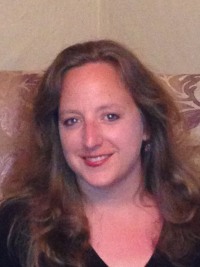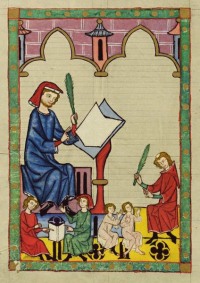
Laura Morreale
In the days of too few university positions and an increased appreciation for quality-of-life concerns, this series aims to pass on members’ experiences as non-tenure track medievalists to students currently in graduate school or to those who are just turning their attention to the job market. We hope to demonstrate the many ways that medievalists can contribute to the field, and to open a discussion about how the skills we gain as medievalists can be used outside academia. As law and business professors have long known, the ability to articulate how a common set of skills translate to the job market is beneficial to all medievalists who are negotiating their work environments, whether inside the academy or not. Our first contributor is Laura Morreale, Associate Director of Medieval Studies at Fordham University in New York City.
Medievalist Mom
This is the story of how I got my current position, Associate Director of Medieval Studies at Fordham University, and how my training as a medievalist helped me in my first post-degree job, as mother of four. I received my MA in Medieval Studies and my PhD in History at Fordham, graduating with the MA in 1996 and the PhD in 2004. By the time I had my PhD, I also had three children, all under the age of 8. My husband and I were living in Washington, DC and struggling with balancing the demands of parenting and professional life.
I graduated in May of 2004, and by September, was teaching a two-semester Medieval History course at a local university, thanks to a friend who had recommended me for the position during her research leave. I had initially been a bit lukewarm about my teaching experience in graduate school, but thought that adjuncting was what people with PhDs did so they could continue to research. After a year as an adjunct, however, I was more convinced than ever that teaching was not for me (nor for my poor students), and because it was completely impractical for me to undertake the type of academic job search that might result in a job I could accept, I resigned myself to the fact that my principle job title for the foreseeable future was going to be “Mom.”
I realize this may be a taboo topic among those in professional schools, but the desire for a healthy family life is a real concern for many people and should not be trivialized or ignored. Despite a general feeling in some workplaces and professions that children should not be mentioned and should definitely not have an effect on one’s career trajectory, many of us are called to parenthood, which does not automatically disqualify us from contributing in one way or another to our chosen fields.
On the contrary, I found scholarship and motherhood to be strangely, if at times stressfully, symbiotic. In many ways, parenthood helped me to be a productive scholar, because I was forced to be efficient with the small amount of research and writing time I had on hand. For many years, it was naptime or no time to get through my reading or writing tasks for the day, and if I didn’t get it done then, I wasn’t getting it done at all.
On the other hand, my training as a medievalist helped me enormously as a parent. People would often ask me, “How do you continue with your scholarship when you are also a full-time Mom?” and my answer would be, “I don’t know how people can be parents without having something like this.” I know I would have done a much poorer job as a parent if I could not have slipped away to thirteenth-century Venice once in awhile. Moreover, I was able to create an identity that was distinct from being my children’s mother or my husband’s wife.
While I was unable to go away for extended research trips to far-off archives, I did bring photocopies of primary sources to the playground, and often skimmed through the next article I had to read as I was waiting in the carpool line to pick up my children from school. My children were enormously proud of me when I had my first bit of work published, and were happy to tell their friends that I was a real medieval historian. In this way, I was able to, among other things, publish a book-length translation, participate in a colloquium at the Folger Shakespeare Library that resulted in an article published in Speculum, write several small encyclopedia articles, publish several pieces in a new History web magazine (for which I was paid actual money), and research and create two scholarly websites hosted through Fordham’s Center for Medieval Studies. One of these websites, which boasts over nine thousand hits per year, will be the basis for next year’s annual conference at the Center, bringing together scholars from across the country and from Europe. In the end, I did not have to do research while I was a mom, I got to do research, and that approach was very helpful as I built my post-grad-school CV.
My ability to remain productive was, as I have been told, one of the main reasons that I was able to secure my current position, which I began in August 2012 just after my fourth child turned two. Other skills included my willingness to learn digital programs, my ability to multi-task, stick to deadlines, and follow-through on projects I had undertaken. In my current job, I do not make anyone sit through my lectures, and I am able to participate in the enriching life of the Center, talking to faculty and graduate students about their work, and taking advantage of what the University offers in terms scholarly advancement, particularly in terms of digital humanities and technology. I feel that I am contributing to Medieval Studies both at my University but also world-wide, through the websites and some of the other publishing venues I found when I was a scholar-mom, which I may not have sought out had I remained on a more traditional career path.
If I were to give any advice to those seeking to use their medievalist skills outside of academia, it would be the following:
- Develop digital skills. Not having them is almost not an option these days, and they can increase the flexibility of your work life.
- Decide what you like about what you have learned, and maintain that. For me it was not teaching, but research and writing that I enjoyed.
- Participate in the professional fields that interest you, by volunteering or demonstrating some sort of active interest during graduate school. The time investment can be minimal, but what you will gain in terms of networking and the ability to speak authoritatively about the field will help as you look for a post-grad-school position.
And finally, remember that most careers these days are not linear, meaning that few people end up in the jobs they envision when they undertake a course of study. Your expectations for what constitute a successful and enriching career may change over time, and you may find yourself in a career that uses your skills in ways you could never have predicted.





